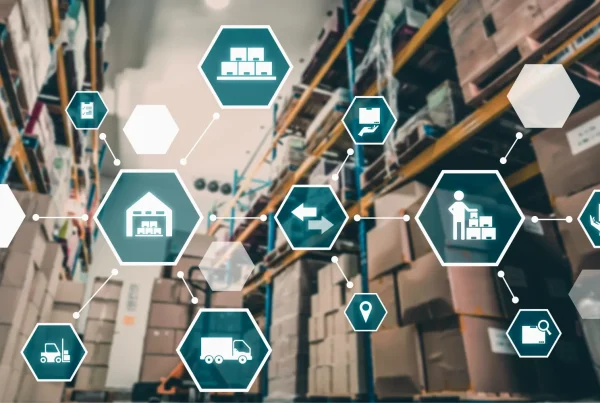Successful businesses today are about more than great products. They require precision in decision-making and efficiency in business operations. The margins between profit and loss now depend heavily on how quickly and accurately businesses can make decisions. Traditional analytics tools offer insights but don’t act on them.
AI Agents do.
Agents analyze data, predict outcomes, and automatically take action, streamlining tasks that traditionally took days or even weeks, significantly boosting operational efficiency.
Imagine having demand forecasts that adjust in real time, supply chains that proactively predict disruptions, and prices that self-optimize in response to market changes. AI Agents turn these possibilities into reality, and industry leaders are already leveraging them to stay competitive.
In this blog, we explore powerful AI Agent use cases revolutionizing retail—covering demand planning, supply chain optimization, merchandising, pricing, and business intelligence.
If you’re not yet using AI Agents, the real question is: How much longer can you afford to wait?
The AI Agent Revolution
From Traditional AI to Agentic AI
Traditional AI models or simple reflex agents analyze data with limitations and provide insights, waiting for human intervention. Agentic AI, however, is transformative—it not only processes data but makes real-time decisions.
These AI-powered agents are autonomous decision-makers. They learn, adapt, and execute tasks while keeping humans informed of critical decisions. Whether adjusting forecasts, optimizing pricing, or managing supply chain disruptions, AI Agents act as intelligent partners, enhancing—not replacing—human judgment.
Why AI Agents Are More Than Automation
Many businesses mistake AI Agents for simple automation. Traditional automation follows fixed rules, but AI Agents adapt to changing conditions, independently optimize outcomes, and leverage reinforcement learning, Large Language Models (LLMs), and multi-agent systems.
For example, a demand-planning AI Agent can instantly forecast sales based on real-time trends, market factors, and even weather, preventing overstock or stockouts without human intervention.
AI Agents and Decision-Making
AI Agents bring unparalleled speed and accuracy to everyday business functions. They rapidly analyze vast datasets, predict outcomes, and instantly act, helping businesses optimize supply chains, pricing, operations, and more.
Understanding AI Agents
AI Agents are autonomous systems capable of acting, adapting, and optimizing without continuous human input. Unlike traditional AI, which only generates insights, agents directly execute decisions in real-time scenarios.
Think of them as intelligent digital employees who continually learn and adjust based on new information. From optimizing demand forecasts to managing logistics, AI Agents operate independently, improving business outcomes.
AI Models vs. Autonomous Agents
- AI Models: Forecast demand but require human action.
- AI Agents: Forecast and autonomously adjust purchasing and inventory levels in real time.
The Role of Reinforcement Learning, LLMs, and Multi-Agent Systems
AI Agents use reinforcement learning for continuous improvement, LLMs for intelligent comprehension and response, and multi-agent systems for collaborative efficiency across business processes.
For instance, retail businesses utilize:
- Demand planning agents to manage stock levels.
- Pricing agents to optimize discounts.
- Supply chain agents to ensure seamless logistics.
These combined agents form an automated, self-improving ecosystem. The question isn’t if businesses should adopt AI Agents, but how quickly they can deploy AI Agents.
Top AI Agent Use Cases
AI Agents dramatically improve efficiency across numerous business functions. Let’s explore different types of AI Agents use cases:
Demand Planning
- Real-Time Demand Sensing: Agents adjust forecasts using live sales, market trends, and competitor actions.
- Scenario-Based Planning: Agents simulate multiple market scenarios for better preparedness.
- Automated Inventory Adjustments: Agents proactively redistribute inventory based on regional demand.
- Supplier Coordination & Risk Mitigation: Agents monitor suppliers and recommend alternatives to prevent disruptions.
Supply Chain Optimization
- Predicting Disruptions: Agents proactively detect and mitigate disruptions.
- Dynamic Stock Replenishment: Real-time adjustments minimize stockouts and excess inventory.
- Smart Distribution: Agents optimize transportation routes to reduce costs.
- Automated Supplier Collaboration: Agents enhance coordination with suppliers, reducing manual tasks.
Merchandising
- Data-Driven Clusters: Hyper-localized assortments based on customer preferences.
- Dynamic Assortment Optimization: Continuous real-time assortment adjustments.
- In-Season Reallocation: Early detection of demand shifts for optimal inventory redistribution.
- AI-Native Planogram Adjustments: Real-time product placement optimization.
Pricing & Promotions
- Dynamic Price Adjustments: Real-time pricing strategies aligned with profitability.
- Intelligent Promotions: High-ROI discount strategies tailored to customer segments.
- Seasonal Pricing Automation: Proactive adjustments during peak periods.
- Personalized Offers: Customized promotions to enhance conversions.
Business Intelligence
- Unified Data Insights: Real-time integration of sales, inventory, and market data.
- Performance Gap Identification: Instant identification and rectification of business issues.
- AI-Powered Forecasting: Accurate predictions of market trends and consumer behaviors.
- Cross-Functional Collaboration: Coordinated decision-making across business units.
Industry Spotlight
- Retail: Precision forecasting and dynamic pricing eliminate guesswork.
- CPG: Efficient inventory management reduces waste.
- Hospitality: Dynamic pricing maximizes per-room revenue.
- Fashion: Real-time trend predictions and optimized assortments reduce markdowns and improve sell-through.
Building an AI-First Organization
To effectively leverage AI Agents, organizations need to strategically approach adoption:
- Align AI Systems with Strategy: Clearly define objectives, desired outcomes, and key performance indicators (KPIs).
- Create a Connected AI Ecosystem: Unify data, ensure real-time adaptability and integrate seamlessly with workflows.
- Proactively Address Risks: Tackle AI bias, ensure data security, and build trust with transparent decision-making processes.
- Scale Across Teams: Empower employees with AI literacy and create a culture of experimentation and continuous improvement.
The Future of AI is Agentic
AI agents are more than a technological trend—they represent the future of intelligent, adaptive businesses. Companies adopting AI agents today will set the pace for tomorrow, making smarter, faster, and more profitable decisions.
Ready to transform your business with AI agents? Discover more about AI Agents from Impact Analytics and step confidently toward an intelligent future.
Frequently Asked Questions
How do AI Agents differ from traditional automation?
AI Agents don’t just follow rules—they learn, adapt, and make real-time decisions based on changing data while considering human decisions.
Can AI Agents work across different business functions?
Yes. They optimize demand planning, supply chains, pricing, and merchandising by automating complex decisions.
What are some Agentic AI use cases in retail?
AI Agents help in dynamic pricing, personalized promotions, real-time stock optimization, and predictive demand planning.
Are AI Agents replacing human decision-makers?
No. They enhance human decisions by providing faster insights and eliminating guesswork.
Why is now the right time to adopt AI Agents?
The market is changing fast. AI Agents help businesses stay agile, reduce risks, and maximize growth opportunities. The sooner, the better!





